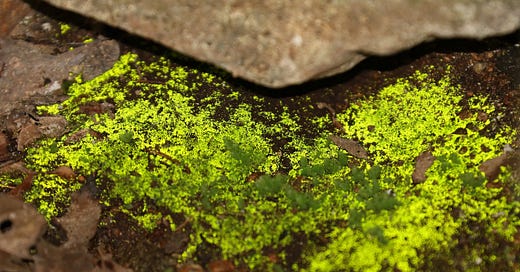That is the question being asked by a specific subset of plant biologists across the globe. There is a class of plants that can grow in caves, not by the mouth of the caves but deep inside where the sunlight doesn’t reach. How is that possible?
Certain plant seeds are brought in by wind, rain, or other animals and can adapt to living in the darkness. But that only lasts for a certain amount of time. Unless aided by artificial light, either installations or by cave explorers’ headlamps, the plants end up dying because, well, nature is fickle.
Finding the balance between darkness and light is particularly challenging. Scientists are trying to come up with the right intervention that allows for artificial light to fuel growth, not mess with the cave’s ecosystem too much, and most challengingly hope that the humans involved don’t screw it up.
If that sounds hard, you’re right. Attempting to figure out that aforementioned balance is one of the more complicated dynamics in our experience as humans. We know we need darkness and yet it’s overwhelming in what it can make us feel: anxious, overwhelmed, and afraid. So how do we strike it? There’s probably not one fool proof solution but a potential idea comes from the special shabbat we find ourselves in this weekend.
This is the final of the special shabbatot before Passover called Parshat Ha’Chodesh, which is always read on the Shabbat preceding the month that brings in Passover. On this Shabbat, we read the section of Torah that we just read a few months ago that details the first Passover experience and the reminder that time is the first gift given to the newly freed Israelites.
The Sfat Emet, the great Rebbe of the Gerrer Chasidic dynasty teaches powerfully about this dynamic. Commenting on a story of a great sage, Rabbi Elazar ben Arach, who had lost his knowledge after he had gone into exile and only received it back after returning to his home, the Sfat Emet says the following:
1All aspects of renewal contain concealment from the get go. This can be seen in the fact that they had to descend to Egypt in order that they could come to the light of redemption, which came after their exile which ended up being their renewal…
Nisan becomes the new year for Kings in that we accept God's kingship over us. Avraham did this first when he revealed God's kingship to the world and in so doing, he found renewal in a place of concealment. Israel similarly went through this coming out of Egypt.
Any moment in life when we come to a place of renewal and redemption is usually preceded by some aspect of darkness and concealment. We tend to forget that when we’ve come out of it though. Would the Israelites have traded their experience in Egypt for the promised land they ended up receiving? We’ll never know.
But the Sfat Emet argues that the darkness of that experience was essential to their growth. Similarly, Abraham, when he set out on his journey was surrounded by uncertainty. Would this new mission work? Perhaps not, yet he continued.
That’s the thing about exile. We have to hope that it ends. That hope, in and of itself, is the buoy upon which redemption depends. Often it’s born in darkness.
A little bit later in time, the Esh Kodesh writing in the Warsaw Ghetto wonders why at the beginning of the special reading, there is so much repetition of “beginning” language and “for you”:
הַחֹ֧דֶשׁ הַזֶּ֛ה לָכֶ֖ם רֹ֣אשׁ חֳדָשִׁ֑ים רִאשׁ֥וֹן הוּא֙ לָכֶ֔ם לְחׇדְשֵׁ֖י הַשָּׁנָֽה׃
This month shall mark for you the beginning of the months; it shall be the first of the months of the year for you.
He offers the following answer2:
One of the tasks of the Jewish person is to spread the ability to go from light to darkness, not just for themselves but for other people…and not to run away from the darkness. Rather, they should also say that the darkness contains divinity because we know that it says that God is the creator of light and dark.
It’s a magnificent lassoing of two elements that we see at odds. First, he reminds us that when we traverse the rocky path between darkness and light, we shouldn’t hoard the secret of our journey. We have to share it with others because the complicated relationship between light and dark is universal. It’s for you, for you, and also for you.
But then he goes on to remind us to not run away from the darkness too quickly because the darkness is an inevitable part of life. It’s often at the beginning of all of our journeys. Just like it was for the Israelites and Abraham, learning to see in that darkness is key. Remembering that it contains something divine can be life changing.
I bet we all can remember a time in our life reflecting back when we can picture our own journey and realize how much we learned from being in a dark place. Maybe with the help of friends or family or other support systems, we were able to find the light again. But that experience in the dark made the moment in the light that much more revelatory.
That’s the thing about darkness. It’s not where we want to live all the time. After all, we are not like subterranean cave fauna. Yet, there’s value in spending some time there. For when we can find a spark in that darkness, by really being in it, we can make the illumination that we feel afterward that much brighter.
Shabbat Shalom and Happy Weekend!
Parashat HaChodesh 1:4
Derech Hamelech Ha’Chodesh 1




Good analogies! I know, for me, personally, the darkness can also mean, a good nights rest, waking up to light, with the hope of renewal for the day. Enjoy a meaningful Pesach next week, surrounded with light and love! ❤️✡️Zeta